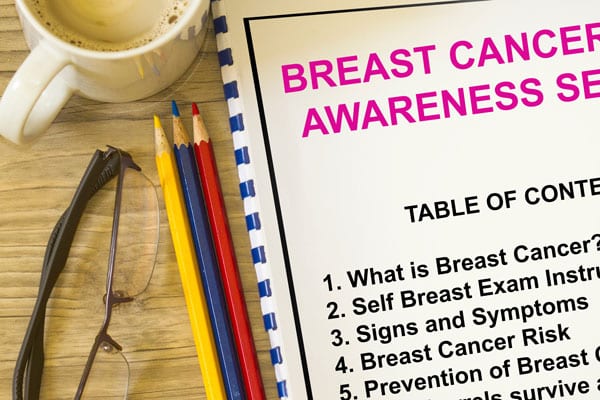Breast Cancer Awareness: How Knowledge Influences Outcomes

Understand how symptom detection, risk reduction, and early diagnosis can improve survival rates.
Breast cancer is a formidable adversary.
Breast cancer is one of the most prevalent cancers diagnosed among American women, with approximately 264,000 cases reported annually. Alarmingly, an estimated 42,000 women may not survive their breast cancer diagnosis.
Breast cancer isn’t just a woman’s disease. Approximately 2,710 American men are also diagnosed with breast cancer yearly, and 20% of these will face a challenging prognosis.
While breast cancer is a formidable adversary with daunting statistics, improving knowledge and taking proactive steps can significantly influence positive health outcomes for individuals and our nation.
Early symptom detection matters.
The cornerstone of improving breast cancer survival rates is early detection. Annual check-ups and mammograms are the gold standard for detecting breast cancer and abnormalities, often before symptoms appear.
However, between these yearly healthcare visits, there are at least eleven months when symptoms may go unnoticed. Therefore, understanding your breasts' typical appearance and texture is crucial for promptly recognizing any changes.
How to recognize symptoms.
A new lump or mass is the most obvious sign of possible breast cancer, but it may not be the first symptom. Other potential symptoms include:
- swelling of all or part of the breast
- skin dimpling resembling an orange peel
- breast or nipple pain
- nipple retraction,
- red, dry, flaky, or thickened breast skin or nipple
- nipple discharge (other than breast milk)
- swollen lymph nodes under the arm or near the collarbone.
While the above symptoms can also be related to non-cancerous (benign) breast conditions, it is important to schedule an appointment with your healthcare provider as soon as possible if you are experiencing any changes in your breasts.
Trained medical professionals can help you get the care and testing necessary to determine if further care is needed.
Proactive steps to reduce your breast cancer risk.
Prevention is always preferable to treatment. Here are nine recommended lifestyle choices that can reduce your risk of developing breast cancer:
- Maintain a healthy body weight and engage in regular exercise.
- Abstain from alcohol consumption or drink in moderation.
- If you're using hormone replacement therapy or birth control pills, discuss the associated risks of the medication with your doctor.
- Quit smoking if you're a smoker. If you don't smoke, don't start.
- Limit exposure to second-hand smoke.
- Whenever possible, consider breastfeeding your children.
- Conduct regular self-examinations to identify any changes promptly.
- Know and discuss your family's breast cancer history with your doctor.
- Consult your healthcare provider regarding mammograms and ensure you follow the recommendations.
The crucial role of early diagnosis and treatment.
Breast cancer can be highly manageable and treatable when caught in its early stages. Unfortunately, the Illinois Department of Public Health (IDPH) reveals that less than 10% of all breast cancer is detected early at its most curable stage.
Therefore, staying informed about breast cancer symptoms, implementing risk reduction strategies, and completing routine medical evaluations and mammograms, are essential for maintaining good health.
Most important, if you or someone you love is experiencing symptoms of possible breast cancer, don’t delay seeking medical care. Early diagnosis can lead to better treatment outcomes and an extended, healthier life for men and women of all ages.
If you need additional information about breast cancer or understanding your risk, speak with your healthcare provider. Assistance with diagnostic services (such as routine mammograms) is available for qualified individuals in Illinois by contacting the Illinois Breast and Cervical Cancer Program.
The CDC also provides a directory of their National Breast and Cervical Cancer Early Detection Program on their website.

